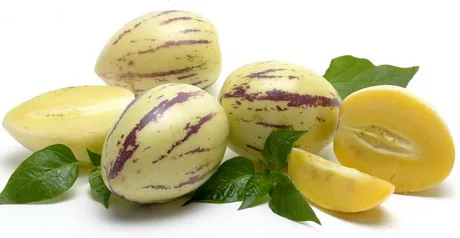Steady is the name of the game on imported pepino melons.
“We’ve been bringing these melons out of Ecuador for almost 30 years and it’s a very popular fruit in that region,” says Robert Schueller of Los Angeles-based Melissa's Produce. “Because of where it’s coming from, they have a pretty consistent weather profile so we don’t anticipate any problems with heat or rain or anything like that. It’s a pretty hearty fruit,” says Schueller.
In the U.S., the fruit, which is in the same family as cucumbers and tastes much like a cucumber (meaning it’s not sweet like traditional melons), is distributed by Melissa’s throughout approximately 20 states. “You can’t find it in all mainstream stores. It’s very focused on a store that carries a lot of Latin and Hispanic products,” says Schueller. “It may also be distributed in a high-end retailer that likes to offer variety but they’re few and far between. We’ve always carried it and we sell a few hundred cases every week nationally.”

Changes in last decade
Schueller notes that for the first 20 years or so it imported pepino melons, sales were minimal. “But in the last 10 years, it’s been pretty consistent in sales,” says Schueller. “I don’t see it trending or anything like that but I don’t see the numbers taking a downturn either.” And while it currently sells the pale white-yellow variety of pepinos, it has in the past experimented with selling purple pepinos as a new item for consumers. However, customers seemed to prefer the white-yellow product instead.
As consistent as demand is, domestic production of pepino melons isn’t within arm’s reach yet. “You can grow it domestically because we grow cucumbers and they grow well in the sunbelt states but there are no commercial growers because the demand hasn’t gotten high enough to grow it here in the U.S,” says Schueller, who also notes that pricing tends to stay consistent on pepinos throughout the year.
For more information:
Robert Schueller
Melissa's Produce
Ph: +1 (800) 588-1281
roberts@melissas.com
www.melissas.com
